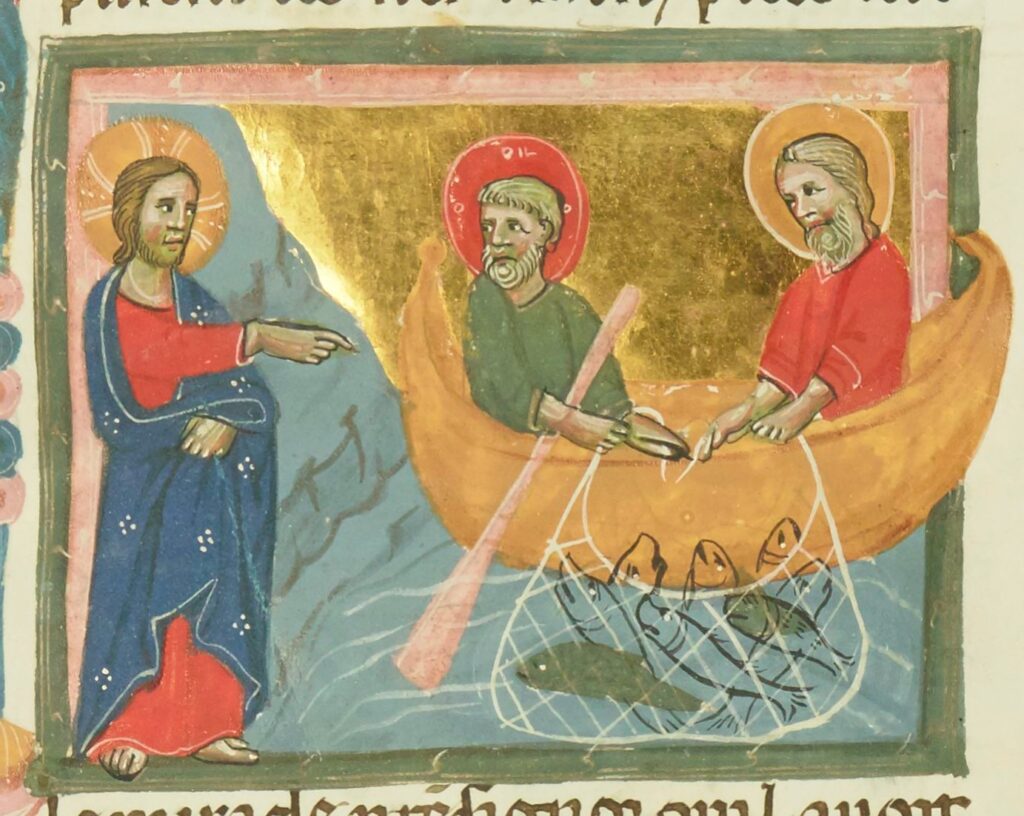Note: If you wish to receive, via e-mail, (1) my weekly newsletter or (2) daily copies of these posts, notify me at rrbates1951 at gmail dot com and I will send it/them to you. I promise not to share your e-mail address with anyone. To unsubscribe, send me a follow-up email.
Spiritual Sunday
In today’s Gospel reading, Jesus calls upon Peter and Andrew to follow him and fish for people. I don’t know if Mary Oliver has this passage in mind in “The Fish,” but I wouldn’t be surprised. Much of Oliver’s power lies in the way she draws on the Christian narrative of death and resurrection.
First, here’s the relevant excerpt from the Gospel reading:
As he walked by the Sea of Galilee, he saw two brothers, Simon, who is called Peter, and Andrew his brother, casting a net into the sea—for they were fishermen. And he said to them, “Follow me, and I will make you fish for people.” Immediately they left their nets and followed him. As he went from there, he saw two other brothers, James son of Zebedee and his brother John, in the boat with their father Zebedee, mending their nets, and he called them. Immediately they left the boat and their father, and followed him.
In “The Fish,” Oliver describes the agony of a dying fish, which appears to have traumatized her at a young age. I note that I had the same experience after watching my first fish gasp for life. Eating it later salvaged the situation somewhat but I stopped fishing after that.
In addition to the fish’s agony, however, Oliver also sees beauty in its death (“the slow pouring off of rainbows”). It is in the second half of the poem, however, where the parallels with Christ’s death and resurrection become apparent.
Getting ready to eat the fish, the poet echoes the Last Supper. Note first the ceremonial way she goes about preparing the moment:
Later
I opened his body and separated
the flesh from the bones
and ate him.
Or as the server says every Sunday when presenting us with the eucharist, “The body of Christ, the bread of heaven.”
For Oliver, eating the fish is about much more than simple consumption. Rather, it puts her in touch with the great mysteries of creation. That process involves pain, as we know all too well, but it also moves us past our individual selves into something greater. Using such Biblically charged terms as “risen” and “fall,” Oliver writes,
Now the sea
is in me: I am the fish, the fish
glitters in me; we are
risen, tangled together, certain to fall
back to the sea.
It is all part, she tells us, of a “feverish plot,” feverish working here as another word for passionate. “We are nourished,” she concludes, “by the mystery.”
In Oliver’s version of resurrection, however, we do not transcend our earthly existence but instead become more deeply immersed in it. Perhaps Oliver can be seen here as a Buddhist Christian—or Christian Buddhist—in that her epiphany is the deep knowledge that she is connected intimately with all the world. It is a connection that Ralph Waldo Emerson captures in “Each and All”:
As I spoke, beneath my feet
The ground-pine curled its pretty wreath,
Running over the club-moss burrs;
I inhaled the violet’s breath;
Around me stood the oaks and firs;
Pine-cones and acorns lay on the ground;
Over me soared the eternal sky,
Full of light and of deity;
Again I saw, again I heard,
The rolling river, the morning bird; —
Beauty through my senses stole;
I yielded myself to the perfect whole.
Oliver differs only in acknowledging that pain too is involved in this yielding. Before the resurrection, in other words, comes the crucifixion. And indeed, it is the conjunction of pain, death, and greater union that nourishes us. In our death, just as in the fish’s death, we become part of something larger.
Here’s the poem in its entirety:
The Fish
By Mary Oliver
The first fish
I ever caught
would not lie down
quiet in the pail
but flailed and sucked
at the burning
amazement of the air
and died
in the slow pouring off
of rainbows. Later
I opened his body and separated
the flesh from the bones
and ate him. Now the sea
is in me: I am the fish, the fish
glitters in me; we are
risen, tangled together, certain to fall
back to the sea. Out of pain,
and pain, and more pain
we feed this feverish plot, we are nourished
by the mystery.
“Nourished” is the perfect word here, merging the earthly and the spiritual. The risen Lord glitters within us.


